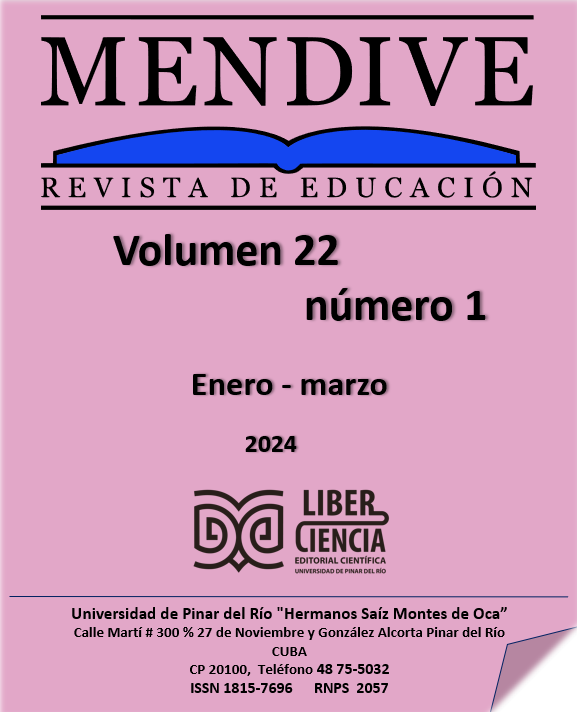Organizational commitment in university professors for job performance in virtual environments
Main Article Content
Abstract
The study was developed in the virtual context considering the greater needs and demands in the work of university teachers, taking into account that the management of teaching staff, the culture of teamwork, as well as the factors associated with organizational commitment have an impact on work performance and educational quality. The research determined the differences regarding the levels of organizational commitment in virtual environments according to the work status of teachers at a private university in Lima, Peru. We worked under a quantitative approach, basic study type, descriptive non-experimental design, with a sample of full-time teachers, the instrument used was the Organizational Commitment Questionnaire, consisting of items with a Likert scale response with five response alternatives and three dimensions: affective, normative and continuity. The results showed that the majority of hired and regular teachers have a regular level of commitment to the organization, so it is concluded that the level of commitment can affect the achievement of goals, plans and institutional projects that are planned annually, as well as the teaching performance, these results will be used by researchers and authorities in decision making.
Downloads
Article Details

This work is licensed under a Creative Commons Attribution-NonCommercial 4.0 International License.
References
Barría, J., Postigo, A., Pérez, R., Cuesta, M., & García, E. (2021). Evaluación de Clima Organizacional: propiedades psicométricas del ECALS. Anales de Psicología, 37(1), 168-177. https://scielo.isciii.es/scielo.php?pid=S0212 -97282021000100019&script=sci_arttext&tlng=es
Bejarano, P., Fernández, A., Centurión, A., & Lima, L. (2022). Factores de gestión escolar en el compromiso organizacional en una Red educativa en Perú. Revista de Ciencias Sociales (Ve), XXVIII(Especial 5), 145-157. https://doi.org/10.31876/rcs.v28i.38152
Cori, S., Hadi, M. & Pacovilca, O. (2019). Gestión del talento humano y compromiso organizacional en una Universidad de Huancayo. Opción, 35(89-2), 1266-1288. https://produccioncientificaluz.org/index.php/opcion/article/view/27526
Coronado, G., Valdivia, M., Aguilera, A., & Alvarado, A. (2020). Compromiso organizacional: antecedentes y consecuencias. Conciencia Tecnológica, (60), 115. https://www.redalyc.org/articulo.oa?id=94465715006
Fabián, S. (2019). Compromiso organizacional y tipo de contrato laboral en hospital del seguro social (Lima, Perú). Revista Gerencia y Políticas de Salud, 18(37). https://doi.org/10.11144/Javeriana.rgps18-37.cocl
Genari, D. & Macke, J. (2022). Prácticas de Gestión Sostenible de Recursos Humanos y los Impactos en el Compromiso Organizacional. Revista de Administração de Empresas, 62(5). https://doi.org/10.1590/S0034-759020220505
Marín, M. (2018). Influencia del clima laboral en el compromiso organizacional del personal docente de una unidad educativa de Cuenca Azuay. Universidad Técnica Particular de Loja. Ecuador. https://dspace.utpl.edu.ec/handle/20.500.11962/21871
Meyer, J. & Allen, N. (1991). A three component conceptualization of organizational commitment. Human Resource Management Review, 1, pp. 61-98. https://doi.org/10.1016/1053-4822(91)90011-Z
Mosquera, D., Castro, M., García, E. & Mory, W. (2021). Clima laboral y el compromiso organizacional en los docentes de una universidad particular de Huacho. Laplage em Revista (International), 7(3), 84-94. https://doi.org/10.24115/S2446-6220202173C1506p.84-94
Orozco, G., Bravo, H., Ruvalcaba, N., González, M., Vázquez, C., & Vázquez, J. (2022). Socialización organizacional y salud mental positiva ocupacional como predictores del compromiso organizacional en docentes de educación superior. Acta Colombiana de Psicología, 25(1), 42-55. https://www.doi.org/10.14718/ACP.2022.25.1.4
Pedraza, N. (2020). Satisfacción laboral y compromiso organizacional del capital humano en el desempeño en instituciones de educación superior. RIDE Revista Iberoamericana Para La Investigación Y El Desarrollo Educativo, 10(20). https://doi.org/10.23913/ride.v10i20.595
Pyhaltö, K., Pietarinen, J., Haverinen, K. et al. (2020). Teacher burnout profiles and proactive strategies. Eur J Psychol Educ., 36, 219-242 https://doi.org/10.1007/s10212-020-00465-6
Setiawan, D., Margana, L., & Akhmad H., (2021). Dataset on Islamic school teachersâ organizational commitment as factors affecting job satisfaction and job performance. Data in Brief, 37, 107-181, ISSN 2352-3409, https://doi.org/10.1016/j.dib.2021.107181


